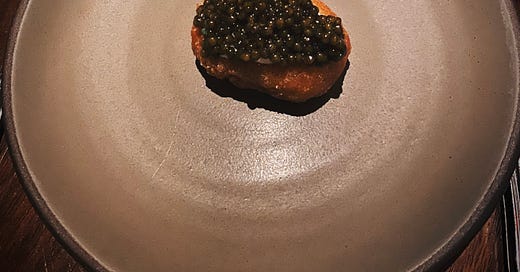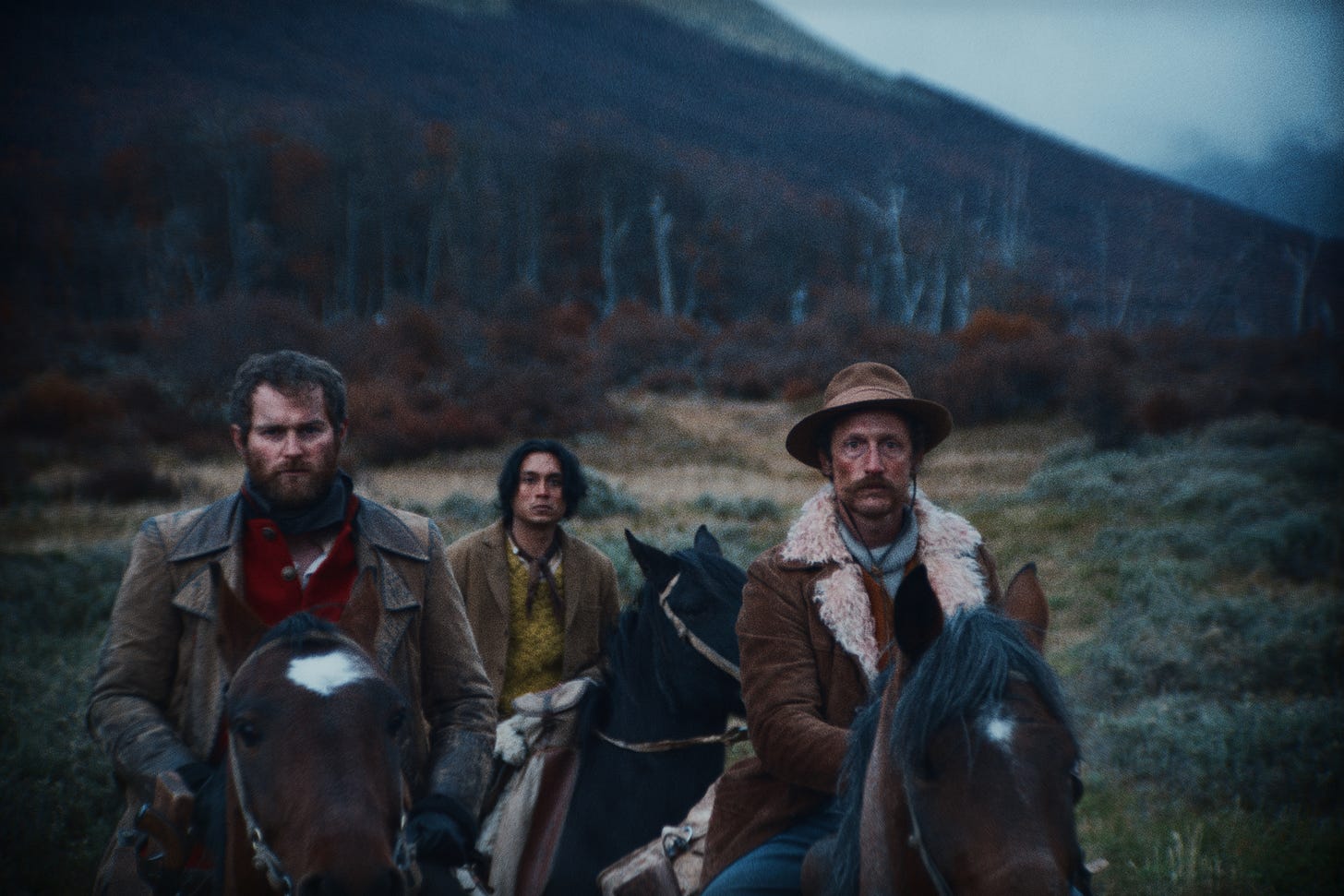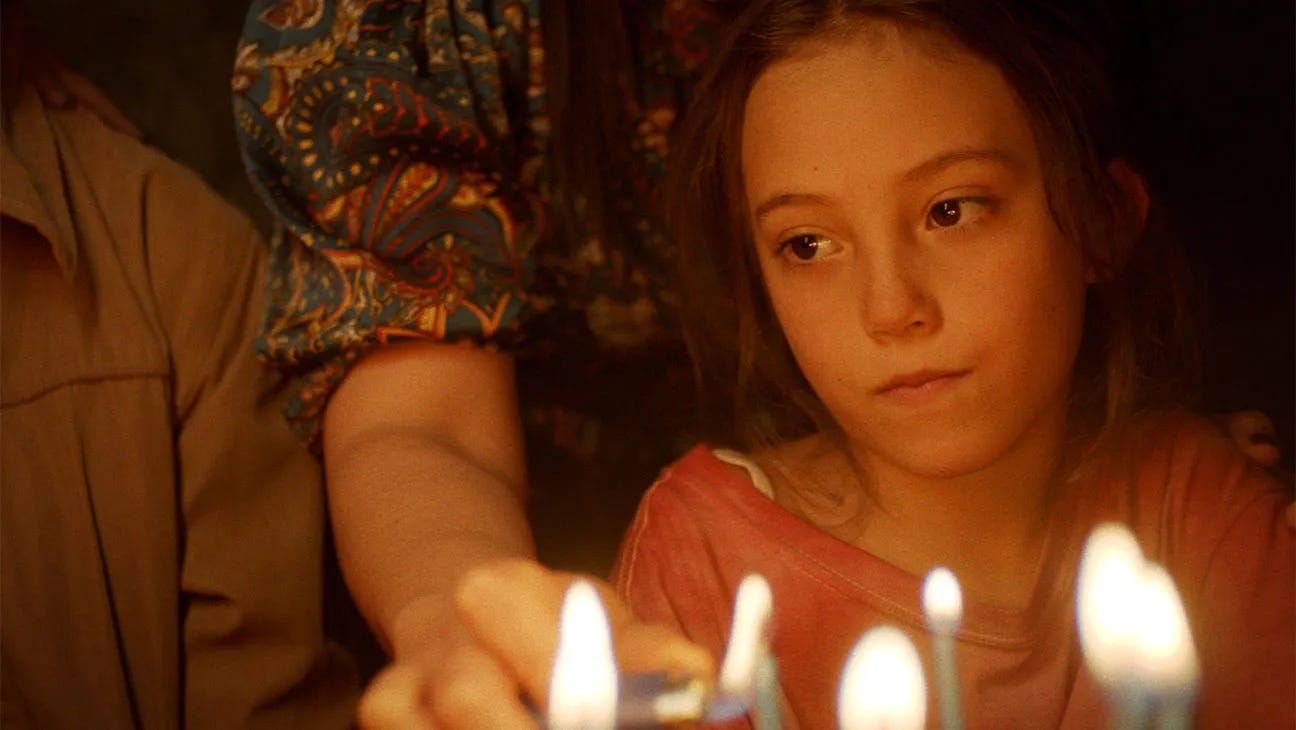New movies, new restaurants — Jan.
Saltburn, The Settlers, The Breaking Ice, Totem. Fried chicken at Coqodaq, uni rice at Moono.
Welcome to moviepudding, a newsletter on film and food, often both. Reintroducing myself today because I’ve had a surge in new subscribers—mostly because I was featured in Joanna Goddard’s Big Salad (!!) where I shared some favorite bits and baubles, including my favorite celebrity sighting. Check it out.
In recent news… Pitchfork was gutted and Cinemascope is closing up shop. Growing up, the former played a crucial role in shaping my music taste, as my parents had little interest in music themselves and it was there that I latched onto mbv and mf doom and learned to signify myself through my musical tastes as we all do at a certain age. Pitchfork's influence expanded beyond the broad pillar of indie/rock and covered more niche, obscure, experimental corners of the world, too. If you're not constantly searching for records or conducting research, or if you're brain doesn’t hold space for more than two interests any more, the absolute best way to discover things enjoy is, imo, by finding a writer whose sensibilities and tastes resonate with you.
The same goes for film, the dire state of which I don’t have to explain. The Toronto-based magazine was one of the last bastions of film criticism. I regret never having mustered the courage to pitch and contribute and am absolutely devastated there will no longer be anywhere, in print, to read brilliant writers on underseen and challenging films.
Meanwhile… the Oscar nominations came out this week. It’s clear the Academ was smitten with steampunk Frankenstein Barbie(aka Poor Things) over Greta Gerwig and her stereotypical Barbie. They did manage to recognize Gosling and America Ferrara, over Robbie, which I think makes sense. Robbie felt cold and strained, very of the Leo Dicaprio school of acting, but more on this and all things Oscars next month!
Today we have new(ish) releases in theaters and streaming, and a visit to NYC’s hottest new restaurant.
SHORT TAKES
Actor Jake Johnson steps into the director’s chair and spins up an affably dotty, though certainly cliched, comedy with SELF-RELIANCE that feels like the porch breeze of sketch comedy rustling through The Game. Your mileage may vary based on your preexisting fondness for Johnson, as well as Anna Kendrick, who plays an unexplainably daffy love interest. Streaming on Hulu.
An utter waste of an evening, LEAVE THE WORLD BEHIND constructs a wall of garden-variety dread only to collapse it into thin air, leaving us with a final punchline about physical media. Sam Esmail prolongs the exposition of this apocalyptic family drama so long that he seems to have forgotten the point of it all, and in the process renders Julia Roberts into a convincing “Karen,” which I guess is something that few directors can say they’ve accomplished. Streaming on Netflix.
INSIDE THE YELLOW COCOON SHELL—Vietnamese filmmaker Phạm Thiên Ân’s debut and Cannes prize winner—presents itself as an act of meditation. In its formal beauty and long takes, it resembles the films of Apichatpong, while its intermingling of reality and fantasy works to amplify its conspicuous religious themes. A perfect addition to Paul Schrader’s canon of transcendental cinema. In theaters.
With SALTBURN Fennell continues to execute her glamorous version of the grotesque—an aesthetic that’s something like Betsey Johnson at the funeral, Molly Goddard gone wrong—while wielding a gross disregard for the basic tenets of narrative storytelling. And yet, her choices aren’t so unhinged as to turn this into a good “bad movie.”
Saltburn drags its feet, and then subject its characters to Fennell’s random whims, that are so frustratingly illogical they suck out any and all enjoyment to be had from watching Barry Keoghan twirling down the mansion halls in birthday suit. The very late-act flashback-reveal is a slap in the face. This is a pauper’s Mr. Ripley, but lest we forget, it did serve us the witchy sass of Archie Madekwe, and for that, I will say, it might have been worth it. Streaming on Amazon.
MOONO, where the old is new again
Handpainted murals, styled in an old Korean folk tradition, look over you from the ceiling at Moono, but your eye may be distracted by other corners and details—woodcut arches, terracotta tile and wood, fluted walls, and a abstract sculpture. The design inflections inside the Romanesque Revival townhouse may clash against each other, but the food and flavors present a more integrated picture.
In the haute landscape of Korean restaurants, Moono is something of an outsider. Sophisticated and less-expensive than other joints (but certainly not cheap), various dishes are dressed up while retaining fidelity to traditional cuisine, one foot firmly planted in the kimchi urn. This is where you might bring parents, like mine, whose propensity for culinary innovation does not extend to their own native cuisine. At Moono, they’ll be happy to learn, the tinkering is light and the dishes would still be recognized by grandma.
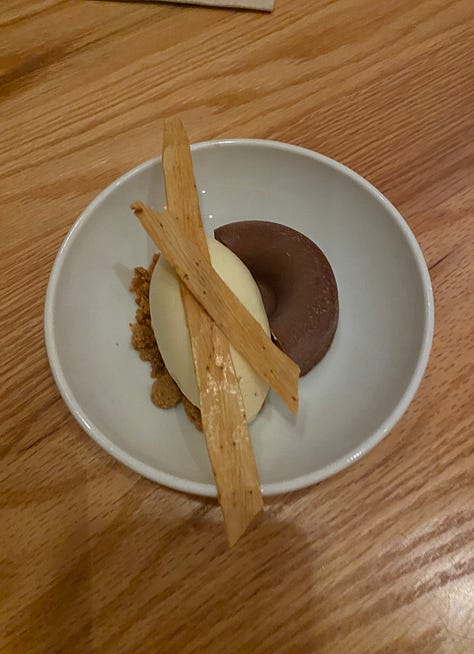
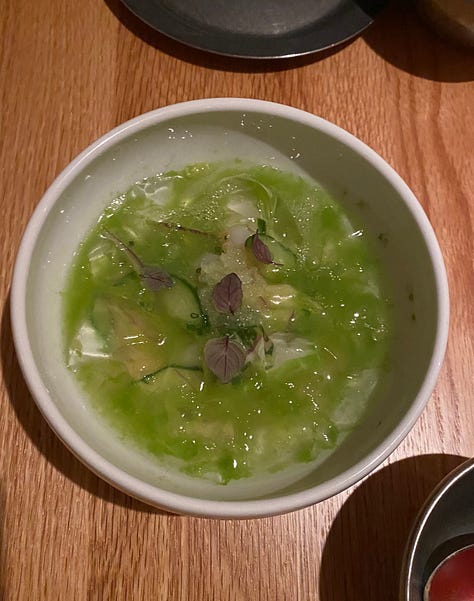
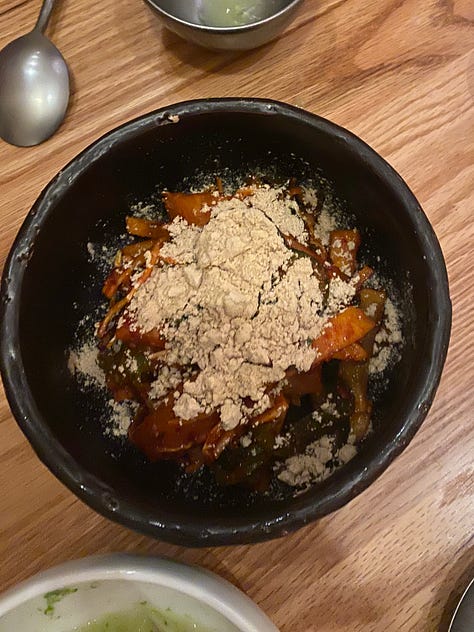
The hwe muchim, for example, elegantly combines raw salmon brushed with sweet and spicy gochujang with a heap of roasted and pulverized soybeans and is served alongside seaweed.
The fried chicken, a mix of wings and drumsticks, is unanticipatedly substantial—and at $19, still pricey, it’s still on par with if not cheaper than actual fried chicken joints/single-item focussed stores. Each wing is uniformly puffed and crisped, and dipping sauce sits to the side. While technically proficient, and delicious, I was not overwhelmed, and having to use your hands for this dish seemed at odds with the rest of mood and tenor of the restaurant.
An appetizer of raw scallop slivers and crisp apples swimming in cold cucumber broth (oi naengguk) is augmented with agar jelly reminiscent of an agua chile. Subtle but perfunctory. I accidentally ordered it on multiple visits because I forgot I had it before.
Kalbi jim, or braised short rib, is forever one of those dishes that is best entrusted/prepared by to someone who knew and loved you when you were young, and it remains so here. This may not be the case with the other mains that change seasonally. It is good, but there are better ways to spend your money, like on the sotbap, which should absolutely anchor your meal. Bowls of fancy imported rice are poured over with beef broth. The uni version is sublime but it’s the mushroom rice that might have the edge. Every time a stone pot is ferried to a table, it’s trailed by a plume of steam and the deep scent of fairytale forest. Even the foie gras, added for texture, gets slightly lost in the mix.
The most transcendent dish though is the burdock ice cream, one of the best things I ate in 2023. The bright charcoalite bitterness of the root complements the familiar bitterness of dark chocolate mousse, adorned with delicate burdock chips. One can imagine enjoying the dessert (which is much more audacious than the corn brûlée buckwheat ice cream) at Jua, the owner’s upscale tasting menu restaurant.
Moono is a stepping stone to such places, an intermediary between the full-blown culinary worldliness of those spots and the homey and ubiquitous eateries on 32nd street. The ambiance and setting at Moono also reflect this intriguing in-betweenness, a posh purgatory bathed in warm lighting that exists somewhere between the stark fluorescence and the alluring half-light, hitting something soft yet sufficiently bright to leisurely peruse your magazine. In essence, like a serene living room.
THE SETTLERS
Felipe Gálvez Haberle
A Scottish soldier, an American cowboy, and a sharpshooting Chilean Mestizo walk into the depths of Patagonia. What happens next is a less a clever joke than part of a cruel blistering truth. Hired by a businessman, the salty trio are tasked with a genocidal mission euphemistically called "clearing the land." In a tight 97 minutes, The Settlers resurrects a buried piece of Chilean history—the tragic extermination of the indigenous Selknam community by the Chileans—and presents it through a contemporary lens.
The land, it must be noted, is ferociously beautiful: singed treebrush and crenulated earth, lapped at by heavy winds and torrential rains. DP Simon D’arcangelo who achieved something similar with Tale of King Crab, lushly captures the rabid splendor and portent with a Starry Night’s worth of dark saturation.
The violence of the film is heavily stylized and unabashedly confrontational. Galvez forces us to stare down atrocities, but shrouds the most incendiary parts in fog. Reverberating beyond the bodily butchery and violations of humanity are those of the spirit, those of language, the passive denials and deliberate erasures of people deemed lesser and other. This is encapsulated in the film’s final act and haphazard coda when the camera shows forces of politics, religion, and money become colleagues of convenience.
Drawing on historical testimonies and records blending fiction and fact, this brisk film isn’t difficult to understand; the characters are purposeful types, and all parties are somewhat complicit. The film is swaggeringly sure of itself—uncommonly so—and that makes it enjoyable enough. With his cards on the table, Galvez turns genre—the inescapably nationalist and barbarous realities of the Western—on its head to condemn a country’s racist and prejudiced past. In theaters, coming to MUBI eventually. Update (3/29): Streaming now. Here’s 30 days free with my link.
RIYL: Blood Meridian, the geographical splendor of Godland, spaghetti Westerns, The Sisters Brothers book by Patrick Dewitt, not the movie by Jacques Audiard, Ole Munch from Fargo—Sam Spruell graces us with his brooding presence once again.
THE BREAKING ICE
Anthony Chen
Redolent with longing and loosely tracing the edges of Jules and Jim (1960), Anthony Chen’s menage a trois drama is an instantly familiar story which one can slip into with ease. It’s a vividly relatable portrait of youthful melancholy that has the potential to delight disaffected teenagers searching for a Garden State moment and also any elder millennials who are mature enough to look upon that movie with any semblance of fondness or objectivity.
Haofeng—a young man who works in finance-worker who makes enough money but probably hates his life—arrives in Yanji for a friend’s wedding but stays for a while longer when a bit of technological displacement lands him in the company of the bus tour guide named Nana, a sparkling pixie, and the restaurant worker named Xiao who pines for her. This movie deals less with any conflicting romance between these politely lustful strangers than the intimate bond between them. These characters don’t flirt; they glean recognition of each other’s sadperson souls and psychological scars. Some of those are more fleshed out than others, but none are very impactful. The film becomes increasingly encumbered by sentimental and heavy-handed choices—a scene of ice cubes & crying brings new meaning to tears in the club—that put a damper on its glittering sadness.
Bolstering the mood is an original score by Kinn Leonn, some combination of Nathan Micay and ambient Japanese electronica. (Music heds please save my debauched comparison and advise on better contemporaries; and once again, RIP to Pitchfork.)
RIYL: David Gordon Green’s All the Real Girls, giving in to small mischiefs, winter time, replaying the opening scene of Millennium Mambo.
TÓTEM
Lila Avilés
The rustling interplay between life and death, restlessness and hope, creates an evocative atmosphere in Lila Aviles’s second feature, a poignant and unnervingly intimate portrayal of a young girl's experience on her father's birthday. Sol, a seven-year-old girl, grapples with her father's terminal illness as her family prepares for the evening celebration at grandpa's house, bustling with aunts, uncles, cousins, cats, and a goldfish. Dad remains hidden in his room, becoming the focal point of anticipation and uncertainty. When will he emerge, and how might he react?
Tótem skillfully weaves and unravels the collective grief of an extended family over the span of a single day. Everyone copes and occupies themselves in their own unique way. One sister, who we meet dyeing her hair in the kitchen sink, seeks solace in a dubious psychic who wards off evil spirits with burning bread rolls on a stick. Another sister, falsely blithe, retreats from the merry-making to concentrate on the cake, pouring all her efforts into it.
Above all, the film gracefully captures the perspective of Sol, thoughtful and perceptive, devoid of excessive cuteness (that honor would go to her younger cousin clinging to her mum’s leg). Over the course of the film she fends off boredom and navigates the various emotions as the impending loss becomes more concrete: resignation, isolation, quiet anger, even self-medication (accidental, of course).
As guests arrive, we anticipate a crescendo in familial misgivings and the crash of social blunders but are greeted with a different kind of discomfort. The festive buzz, rather than deflate like a sorrowful balloon, stops abruptly into a chilling moment of awareness. It is this final scene that sets it apart from everything else and cements Avilés’ talent as a filmmaker. Opens in theaters today.
RIYL: Carla Simón’s Alcarràs, movies that take place in single location/day, not liking Beast of the Southern Wild, Julie Byrne.
Is it worth it? Coqodaq
What is a restaurant for? The most important thing when choosing where you’d like to eat is that your intentions match the restaurant’s aims. At Coqodaq they’re serving performative ebullience alongside tasty fried chicken, or as their copy puts it, a “ridiculously fun time.”
This, in other words, is a clubstaurant—albeit one with superior food and no dress code, though I almost wished there was. When I went last Friday, the highly vaulted space had little trace of the full-blown rager of the Busta Rhymes hosted opening-night party, but with its horseshoe booths and its golden arches, Coqadoq beckons your indulgence.
Keep reading with a 7-day free trial
Subscribe to MOVIEPUDDING to keep reading this post and get 7 days of free access to the full post archives.


